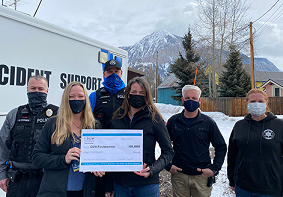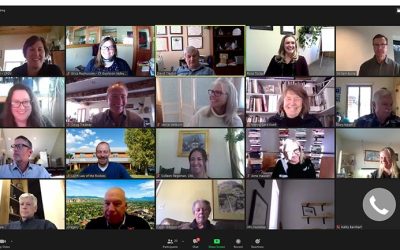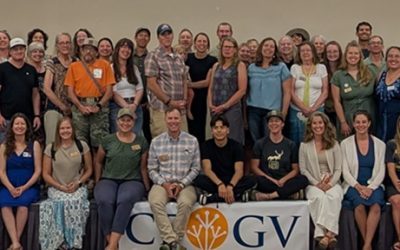Mobile Mental Health Support
 At a time when you can glance in almost any direction and see examples of what isn’t working in society, how refreshing is it to be able to take a closer look at what is?
At a time when you can glance in almost any direction and see examples of what isn’t working in society, how refreshing is it to be able to take a closer look at what is?
Gunnison Valley Health’s Mobile Crisis Team is working, in a major way.
In recent years, the need for more comprehensive and community-based mental health treatment in the Gunnison Valley has been growing. Filling this gap in services has been a priority for Gunnison Valley Health (GVH), leading to the rollout of the Mobile Crisis Team last July. Mobile Crisis provides integrated, short-term crisis response, stabilization, and intervention for adults and children experiencing a mental health or chemical dependency crisis in Gunnison and Hinsdale counties.
Kimberly Behounek, GVH Director of Behavioral Health, and Jenny Birnie, GVH Foundation Executive Director and Community Well-Being Liaison, shared a vision for how to better serve community members. “We saw that people were willing to say that they were struggling and wanted to be part of a creative solution to better address those needs,” Behounek said. Support in this effort was provided by the Community Foundation of the Gunnison Valley in the form of an $80,000 grant, the largest grant CFGV has ever awarded.
The clinicians on the Mobile Crisis Team meet community members where they’re at, both literally and figuratively. They provide 24/7 year-round on-call coverage, responding to crisis situations, often alongside law enforcement and first responders. Clinicians provide on-site and follow-up care, support, and safety planning. After only six months of operation, community members in crisis have already noted feeling more comfortable being evaluated in the least restrictive environment, like their home, instead of having to be admitted straight to the emergency room.
“We want everyone in the community to be able to feel more comfortable reaching out for help, and ultimately be able to reduce the stigma and facilitate community dialogue around mental health just as if it were a physical health issue,” Birnie said.
Over the course of the first six months of the program, the Mobile Crisis Team responded to 82 calls around the county, 69 of which were from new clients to crisis services. Impressively, over 75% of those calls ended in on-site discharge after safety planning, and less than 10% resulted in a trip to the emergency room. Additionally, 75 of the 82 clients received follow-up services within 24 hours.
The data highlights the resounding success of the program thus far, and reinforces how integral it is to the healthcare coverage of our community. The existing stigmas surrounding mental health services have been compounded by the significant stressors of financial challenges, housing and food insecurity, and employment difficulties for people in our region and beyond.
Behounek, who has a plethora of experience in the Behavioral Health field as well as the Gunnison community, has been surprised by the number of people with severe persistent mental illness that have gone unnoticed in our community up to this point.
Access to basic needs like food and housing has plummeted in communities around the country, leaving sparse social safety nets for individuals and families who may already be on the brink of crisis. Gaps in these fundamental needs leave people more exposed to persistent physical, mental, and behavioral health issues, and often an increase in substance abuse. “The majority of clients we have responded to do have significant issues with basic needs,” Behounek said.
The Mobile Crisis Team is an invaluable addition to a growing Behavioral Health Department at GVH. Currently a team of three clinicians, they are looking to add a fourth by the end of the year. This is in addition to Peer Support Specialists, who have been embedded in the community for years now, leveraging their lived experiences and personal journeys as a means to help others through challenging circumstances. “Peer Support Specialists and Mobile Crisis Clinicians are both part of a continuum of services we provide, addressing mental health, physical health, and wellness,” Birnie said.
Originally a staff of just one, Behavioral Health is on track to grow to 18.5 staff and providers by the end of this year. They have goals to expand Medication-Assisted Treatment (MAT) and attract more clinicians with substance abuse expertise.
These community resources remind us that it’s okay to not be okay. To learn more about Mobile Crisis Response and other GVH Behavioral Health Services, visit their website at www.gunnisonvalleyhealth.org.



